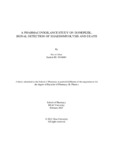A pharmacovigilance study on Donepezil: signal detection of rhabdomyolysis and death
Abstract
Alzheimer’s disease is an age-related neurodegenerative disease that effects the cognitive ability of a person. The cholinesterase inhibitor “donepezil” is used to treat Alzheimer's disease. Donepezil has shown the greatest advantages for improving patient’s lifestyles and cognitive abilities. The goal of this research is to offer a precise statistical analysis of the mortality benefit and rhabdomyolysis ratio in AD patients using the drug donepezil. The FAERS database was utilized to gather information on adverse events that were reported, and ROR was used as a statistical method to determine the mortality and rhabdomyolysis ratio in patients using donepezil. According to our research, donepezil has a positive impact on patient mortality than other cholinesterase inhibitors. On the other hand, in comparison to other cholinesterase inhibitors, donepezil also showed a relatively higher incidence of rhabdomyolysis cases. It has been discovered that donepezil increases patient’s life expectancy, but it has some limitations.

